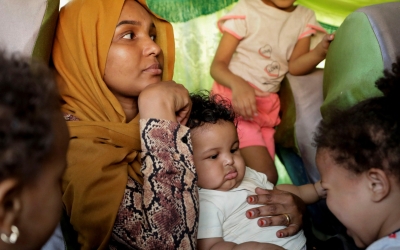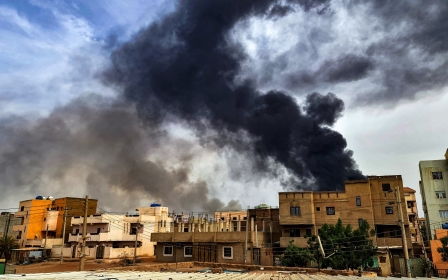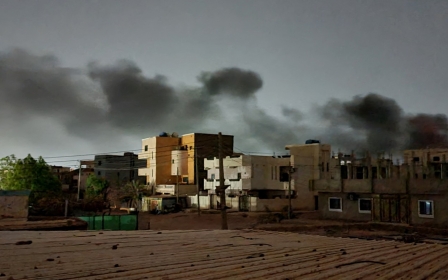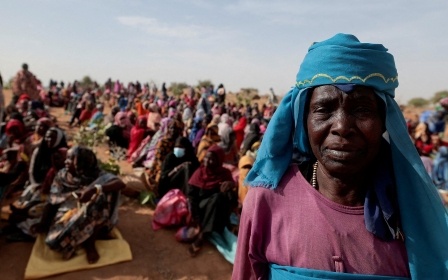Sudan boots out UN envoy as army accuses him of favouring rival
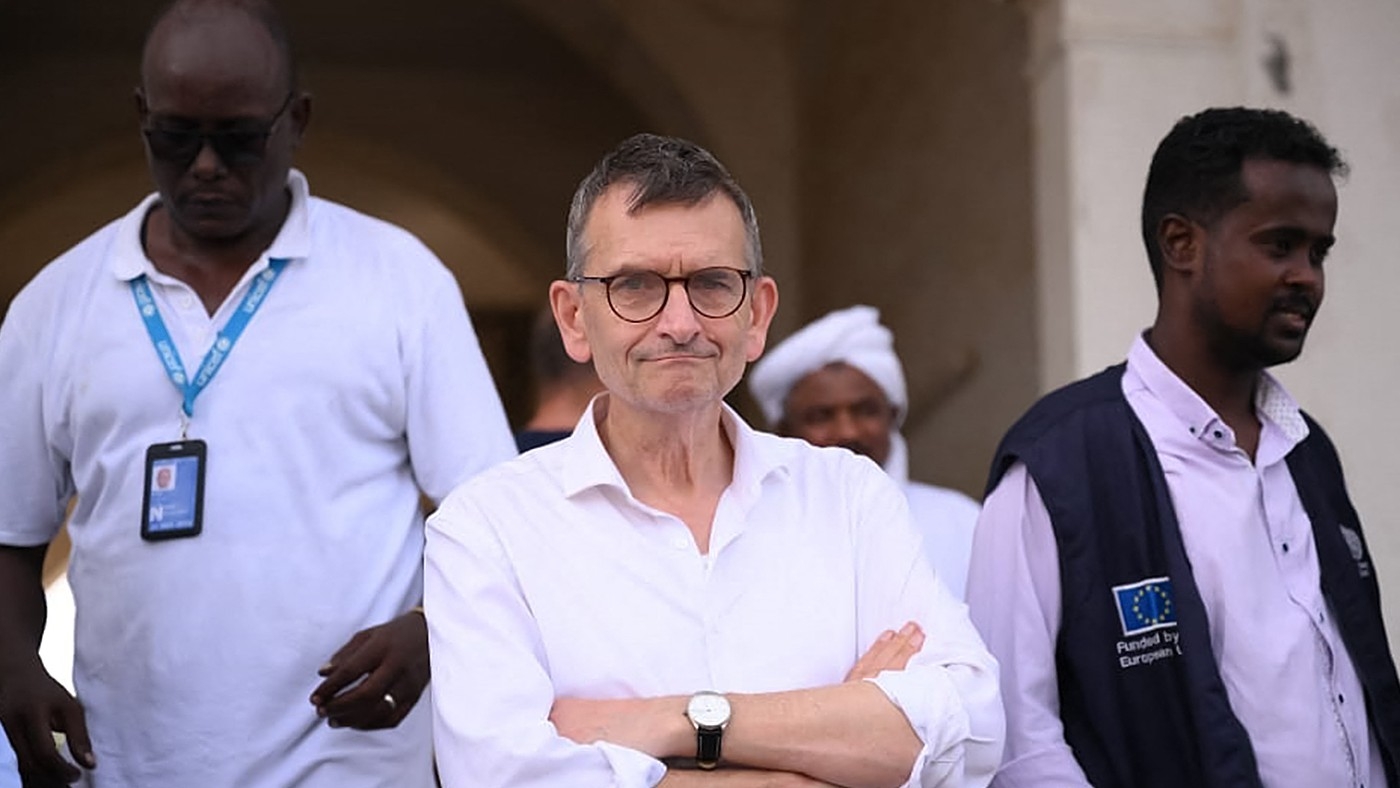
Hostility towards the United Nations Sudan envoy Volker Perthes had been building within Sudanese army circles for many months before the country's foreign ministry declared him persona non grata on Thursday night.
According to Sudanese officials aligned with the army, Perthes "advanced the cause" of rival Rapid Support Forces (RSF) commander Mohamed Hamdan Dagalo during negotiations before and after the agreement in December of a framework deal to transition Sudan back to a civilian-led government.
It was the breakdown of the negotiations that followed the December deal - and particularly the question of how and when the RSF would be incorporated into the army - that helped spark the beginning of Sudan's current war, which began on 15 April when paramilitary forces launched an attack on the army's headquarters and the official residence of its commander, Abdel Fattah al-Burhan.
On Thursday night, the anger at Perthes escalated, as the Sudanese foreign ministry released a statement saying it had notified the UN's secretary general, Antonio Guterres, that the German had been declared "persona non grata as of today".
This means the former academic, who has led the UNITAMS mission intended to assist Sudan's transition to civilian government since 2021, has officially been asked to leave the country. Perthes was in Ethiopia when the statement was made and had not been in Sudan for at least a fortnight.
New MEE newsletter: Jerusalem Dispatch
Sign up to get the latest insights and analysis on Israel-Palestine, alongside Turkey Unpacked and other MEE newsletters
Youssef Ezzat, political adviser to the Rapid Support Forces, told MEE that "there is nothing more between us and Volker than the need to end the Burhan and Islamist coup and return to the political track".
Perthes has yet to comment on the declaration.
The UN mission's mandate is up for renewal this month. It has broad support across the UN Security Council and as such the declaration against its head is a stinging blow. The UN will now consider whether it should impose sanctions and an arms embargo on Sudan.
Fighting between the army and paramilitary has escalated in the last week as the battle for control over the capital Khartoum and its surrounding area escalates.
In Darfur, in the west of Sudan, MEE has reported on atrocities perpetuated by the RSF and Arab militias allied to it. The conflict has also moved beyond Khartoum and Darfur to other parts of the country.
On Friday, the United States and Saudi Arabia announced that the two sides had agreed to a 24-hour ceasefire, to take hold from Saturday morning. Nearly 1.6 million people have been forced to flee their homes since the war began.
The army against the envoy
Perthes has faced criticism from the army, civilian political actors, resistance committee activists and the Sudanese people over the course of his time in Sudan.
In a letter filed by Burhan's envoy Dafallah al-Hajj to the UN last month, Sudan's de facto leader accused Perthes of bias and blamed him for exacerbating fighting between the army and RSF. Burhan said the UN envoy had encouraged Dagalo, better known as Hemeti, and called for him to be replaced.
Defending his employee, Guterres released a statement in response saying that he was "shocked" and that Perthes had his full support. Perthes blamed the conflict on "the two generals at war" and defended the UN against accusations that it had inflamed the situation.
"The disgruntlement from Sudanese Armed Forces (SAF) constituencies towards Perthes has been building for many months now, especially highlighted by international support for the December framework deal," a western military analyst, who cannot be named for security reasons, told MEE.
Perthes has been the target of pro-army protests held outside the headquarters of UNITAMS in both Khartoum and Port Sudan. Those protests were funded by figures connected to the administration of former president Omar al-Bashir, who ruled Sudan from 1989 to 2019, when he was removed from power following a months-long uprising.
The growing influence within the army of figures from Bashir's circles is thought to have played a part in the latest move against Perthes, the western military analyst and two civilian sources in Khartoum said.
'Perthes has witnessed an ongoing political crisis in Sudan since the October 2021 coup and has done nothing about it'
- Ibrahim Alhaj, Gisa Group
The persona non grata statement did not come from Burhan, with the army general’s deputy Shamseddine Kabbashi reportedly in charge of coordinating with Sudanese ministries.
The western military analyst told MEE that Kabbashi has close political affiliations with Bashir-era figures associated with the country's Islamic movement and is favoured by them over Burhan, despite the fact that, as a non-Arab from South Kordofan, he is an “outsider to the Northern riverine elite based in Khartoum”.
Kholood Khair, founder of the Khartoum-based Confluence Advisory think tank, told MEE that the move to remove Perthes was a sign that the German had "outlived his usefulness to Islamists in the army as a straw man, and that those Islamist actors within the army are calling the shots".
Ezzat, the RSF adviser, told MEE that "the army leadership and the Islamists allied with them" did not support the "transitional period and democratic transition" that Perthes was assisting as head of the UN's mission.
He claimed that since the October 2021 coup, which was led by both Burhan and Hemeti, "Burhan wanted to end the UN mission's duties. We objected to that".
The army believed Perthes favoured Hemeti because "we were openly supportive of the political process and the handing over of power to civilians", Ezzat said.
Some members of the Forces of Freedom and Change (FFC) civilian coalition, which signed the December framework deal, are thought to prefer Hemeti to Burhan, seeing the RSF leader as a potential ally who can help them regain political influence.
From last autumn onwards, the RSF's communications strategy has often sought to present Hemeti as a democrat. Two European diplomats told MEE that officials from the United Arab Emirates, which has close ties to the RSF leader, had told them in the early months of 2023 that if they believed in democracy for Sudan, they should support the paramilitary leader.
Now that his fighters are occupying people's homes in Khartoum and burning down IDP camps in Darfur, the idea is harder to sell.
The street against the envoy
But it's not just the army that has been frustrated and angered by Perthes. Many civilian activists believe the UN envoy empowered Sudan's various military forces, thus weakening - unwittingly or not - the country's revolutionary transition back towards democratic rule.
"He has witnessed an ongoing political crisis in Sudan since the October 2021 coup and has done nothing about it," Ibrahim Alhaj, a researcher for human rights monitor the Gisa Group, told MEE. "He has not facilitated any peaceful or political solutions. He just complicates and reports."
Alhaj pointed out that Perthes met Sudan's then-civilian prime minister, Abdalla Hamdok, a day before the coup took place. "So either he does not predict and act well, or he is not an effective person."
Kholood Khair told MEE that "by not engaging with a wide range of actors, by giving primacy to the generals, by following blindly a flawed political process, Perthes has helped the generals to buy time and sideline pro-democracy voices".
"By not engaging regional actors early enough, thereby inviting their enmity, by missing the signs on both the coup and the war and not galvanising international censure after the coup and the war, the UN has failed to make itself relevant to Sudan's ongoing transition," she added.
As for the army's accusations that Perthes enabled Hemeti, Khair said she thought this was something all Sudan's various actors were guilty of.
"The civilians that see him as a conduit to their return to power, as well as the international interests related to mining, security and migration: all are guilty of elevating Hemeti. But a large part of that blame also lies with Burhan, on whose watch Hemeti greatly armed and enriched himself," she said.
Middle East Eye delivers independent and unrivalled coverage and analysis of the Middle East, North Africa and beyond. To learn more about republishing this content and the associated fees, please fill out this form. More about MEE can be found here.


